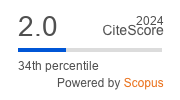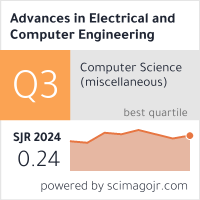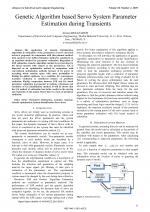| 2/2010 - 13 |
Genetic Algorithm based Servo System Parameter Estimation during TransientsREZAZADEH, A. |
| Extra paper information in |
| Click to see author's profile in |
| Download PDF |
Author keywords
parameter estimation, transient response, genetic optimization, system identification, servo drive
References keywords
rezazade(4), optimization(4), genetic(4)
Blue keywords are present in both the references section and the paper title.
About this article
Date of Publication: 2010-05-31
Volume 10, Issue 2, Year 2010, On page(s): 77 - 81
ISSN: 1582-7445, e-ISSN: 1844-7600
Digital Object Identifier: 10.4316/AECE.2010.02013
Web of Science Accession Number: 000280312600013
SCOPUS ID: 77954628271
Abstract
The application of Genetic Optimization Algorithm in estimation of the parameters of servo electrical drives is proposed. In comparison with this planned method, least squared error (LSE) estimation method is considered as an expedient method for parameter estimation. Regardless of LSE estimation, Genetic Algorithm method is not restricted to the linear systems with respect to the parameters. GA is imported as an optimization method in comparison with conventional optimization methods because of its power in searching whole solution space with more probability to finding the global optimum. As a condition for convergence, transient excitation is considered instead of persistent excitation. Finally, comparison between LSE and GA based parameter estimation is presented to indicate robustness and resolution of GA identification method. It will be shown that the GA method of estimation has better results in the startup and transients of the system where there is a lack of persistent excitation. |
| References | | | Cited By «-- Click to see who has cited this paper |
| [1] Torsten Soderstorm and Petre Stoica, "System Identification", Prentice Hall International Series in Systems and Control Engineering, 1989. [PermaLink]
[2] Bor-Sen Chen, Bore-Kuen Lee and Sen-Chueh Peng "Maximum Likelihood Parameter Estimation of F-ARIMA Processes Using the Genetic Algorithm in the Frequency Domain", IEEE Transactions on Signal Processing, Vol. 50, No. 9, September 2002. [CrossRef] [SCOPUS Times Cited 31] [3] Sunil L. Kukreja, Robert E. Kearney and Henrietta L. Galiana, "A Least-Squares Parameter Estimation Algorithm for Switched Hammerstein Systems with Applications to the VOR", IEEE Transactions on Biomedical Engineering, Vol. 52, No. 3, March 2005. [CrossRef] [SCOPUS Times Cited 52] [4] Benjamin C. Kuo, "Automatic Control Systems" (sixth edition), Prentice Hall, 1991. [PermaLink] [5] J. C. Lagarias, J. A. Reeds, M. H. Wright and P. E. Wright, "Convergence Properties of the Nelder-Mead Simplex Method in Low Dimensions", SIAM Journal of Optimization, Vol. 9, Number 1, pp. 112-147, 1998. [CrossRef] [SCOPUS Times Cited 6396] [6] Ali Reza Rezazade, Arash Sayyah, Mitra Aflaki, "Optimization of THD and Suppressing Certain Order Harmonics in PWM Inverters using Genetic Algorithms", IEEE International Symposium on Intelligent Control (ISIC) 4-6 October 2006, in Munich, Germany. [CrossRef] [7] Arash Sayyah, Mitra Aflaki, Ali Reza Rezazade, "GA-Based Optimization of Total Harmonic Current Distortion and Suppression of Chosen Harmonics in Induction Motors", SPEEDAM Symposium, 23-26 May 2006, Taormina (Italy). [CrossRef] [SCOPUS Times Cited 5] [8] Ali Reza Rezazade, Arash Sayyah, Mitra Aflaki, "Optimal PWM for Minimization of Total Harmonic Current Distortion in High-Power Induction Motors using Genetic Algorithms", SICE - ICASE International Joint Conference 2006 EXCO (Busan Exhibition & Convention Center), Busan, KOREA. [CrossRef] [SCOPUS Times Cited 14] [9] A. R. Rezazade, M. Lankarani, "Parameter Estimation Optimization Based on Genetic Algorithm Applied to DC Motor", Proceedings of ICEE 2007 International Conference on Electrical Engineering, Lahore, Pakistan, 11-12 April 2007. [CrossRef] [SCOPUS Times Cited 21] Web of Science® Citations for all references: 0 SCOPUS® Citations for all references: 6,519 TCR Web of Science® Average Citations per reference: 0 SCOPUS® Average Citations per reference: 724 ACR TCR = Total Citations for References / ACR = Average Citations per Reference We introduced in 2010 - for the first time in scientific publishing, the term "References Weight", as a quantitative indication of the quality ... Read more Citations for references updated on 2025-07-03 05:37 in 49 seconds. Note1: Web of Science® is a registered trademark of Clarivate Analytics. Note2: SCOPUS® is a registered trademark of Elsevier B.V. Disclaimer: All queries to the respective databases were made by using the DOI record of every reference (where available). Due to technical problems beyond our control, the information is not always accurate. Please use the CrossRef link to visit the respective publisher site. |
Faculty of Electrical Engineering and Computer Science
Stefan cel Mare University of Suceava, Romania
All rights reserved: Advances in Electrical and Computer Engineering is a registered trademark of the Stefan cel Mare University of Suceava. No part of this publication may be reproduced, stored in a retrieval system, photocopied, recorded or archived, without the written permission from the Editor. When authors submit their papers for publication, they agree that the copyright for their article be transferred to the Faculty of Electrical Engineering and Computer Science, Stefan cel Mare University of Suceava, Romania, if and only if the articles are accepted for publication. The copyright covers the exclusive rights to reproduce and distribute the article, including reprints and translations.
Permission for other use: The copyright owner's consent does not extend to copying for general distribution, for promotion, for creating new works, or for resale. Specific written permission must be obtained from the Editor for such copying. Direct linking to files hosted on this website is strictly prohibited.
Disclaimer: Whilst every effort is made by the publishers and editorial board to see that no inaccurate or misleading data, opinions or statements appear in this journal, they wish to make it clear that all information and opinions formulated in the articles, as well as linguistic accuracy, are the sole responsibility of the author.



